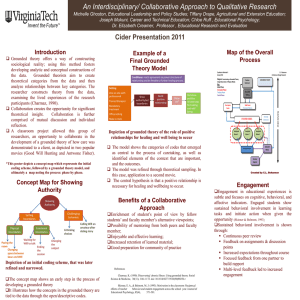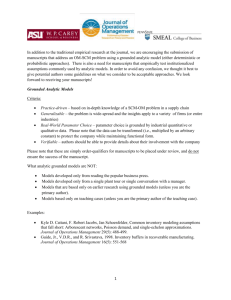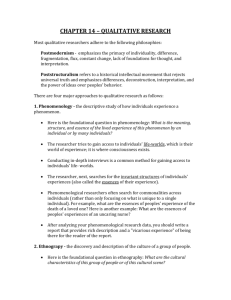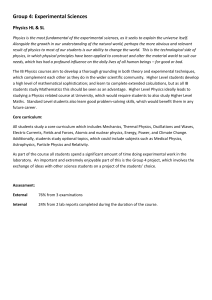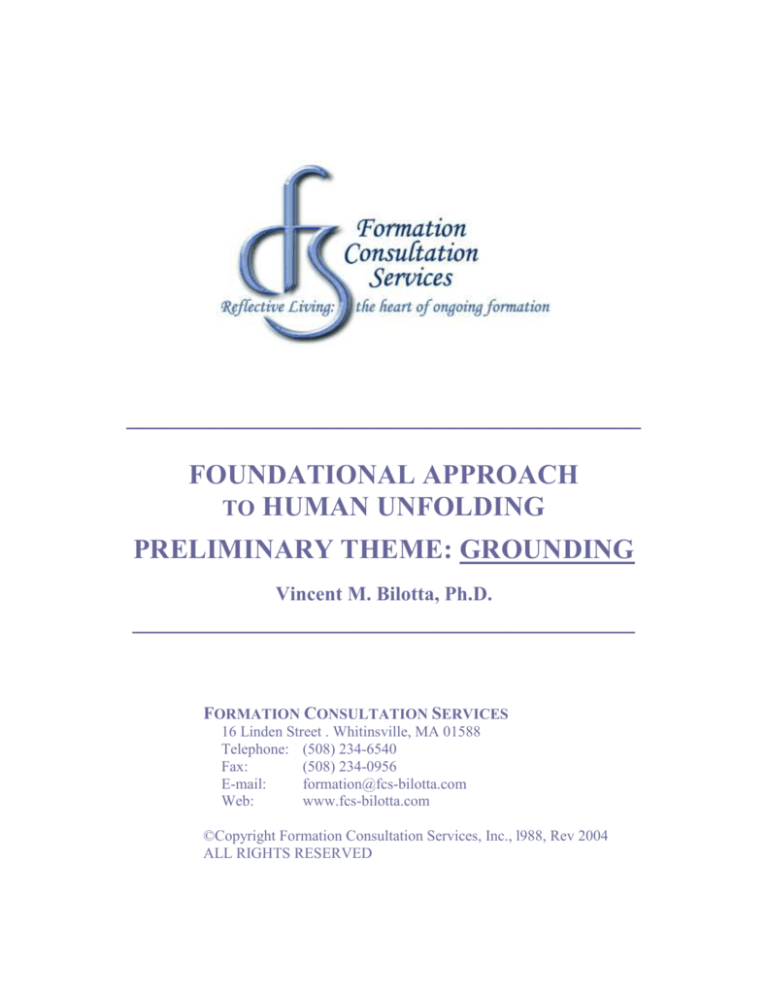
_________________________________________
FOUNDATIONAL APPROACH
TO HUMAN UNFOLDING
PRELIMINARY THEME: GROUNDING
Vincent M. Bilotta, Ph.D.
________________________________________
FORMATION CONSULTATION SERVICES
16 Linden Street . Whitinsville, MA 01588
Telephone: (508) 234-6540
Fax:
(508) 234-0956
E-mail:
formation@fcs-bilotta.com
Web:
www.fcs-bilotta.com
©Copyright Formation Consultation Services, Inc., l988, Rev 2004
ALL RIGHTS RESERVED
Foundational Approach to Human Unfolding
Preliminary Theme: Grounding
Vincent M. Bilotta, Ph.D.
INTRODUCTION
This paper is one in a series that addresses a preliminary theme basic to a
foundational approach to the formative process of human unfolding.
This series takes up in a systematic manner, basic taken-for-granted realities of our
being human, raising them to the level of conscious awareness and inviting us to take
them seriously. Among these are the themes described in these preliminary papers:
energy, breathing, grounding, character, armor, pleasure, stress.
These papers serve as an important background to our articulation of the
anthropological understanding of the human person that underlies our formative approach
to the process of human unfolding. It is our intention to describe and elaborate upon our
understanding of the human person as body, ego and spirit throughout the several papers
that will follow in this series.
We invite you, the reader, to accompany us throughout this journey, taking up this
paper in a dwelling reflective manner. In this way you will be able to make sense of
grounding as it evokes your personal experience and as it is embodied in your life.
GROUNDING
We are all familiar with the word "ground". Construction workers build "from the
ground up". When we are involved in a discussion of some importance, we feel the need
to "stand our ground". We refer to the "ground floor" of a building. We speak of
someone having "grounds for divorce". Major electrical household appliances must be
"grounded" as a safety precaution. We plant seeds, seedlings and saplings "in the
ground". We sometimes "fall to the ground". A casket is "lowered into the ground". We
often see TV footage of the "ground having opened up" in an earthquake. When we do
research, write papers or prepare lectures, our work is "grounded" in a certain frame of
reference and in certain theories.
Real estate developers clear and level the ground to ready it for the building they
intend to construct. When we want to rest and relax in an informal setting, we may sit on
________________________________________________________________________________________________
Grounding
Page -1Formation Consultation Services Web: www.fcs-bilotta.com E-mail: formation@fcs-bilotta.com
©Copyright Formation Consultation Services, Inc., 1988, Rev. 2004 ALL RIGHTS RESERVED
the ground or on the floor. Toddlers spend much of their day on the ground crawling,
walking, sitting, playing. Often, they fall to the ground. The ground appears to be a safe,
familiar and comfortable place for them. We associate the ground with "mother earth":
fertile and life-giving, nourishing, sustaining, holding, containing. When we are hurt or
upset, we may often turn to nature as a soothing space. A graduate school professor once
referred to the earth as "God's gift given to us to enjoy and to rest in", that is, to become
grounded in.
All of these examples point to the ground as fundamental and integral to our human
existence. Without the ground, we would have no place to rest our feet, no place to stand
or walk, no place to connect with ourselves or with others. We would be somewhat like
the astronauts in space, who are extremely vulnerable: they have no ground under their
feet. They float through space, with little control over what they do or where they go.
Their only sense of being grounded is experienced through the hose connecting them to
the spaceship. This hose becomes an umbilical cord, a life-line that keeps them
connected to their familiar world. They literally "hang on by a thread".
How often we too, find ourselves hanging on by a thread. We may feel threatened,
overwhelmed, frightened, insecure, burned out, stressed out, confused. In such situations,
we may retreat to what we "know about" ourselves and our situation. Thus, we literally
pull ourselves off the ground and into our head, ruminating about what "should" be,
trying to understand, to figure out, to resolve, to find answers often split from our
feelings and out of touch with our heart.
We hang on by a thread and we give up our ground when we become excessively
preoccupied with what others will think of us or how others perceive us; when our
decisions are motivated almost exclusively by what is expected of us without taking into
account our own sense of who we are and of what is congenial to us; when we become
excessively caught up in maintaining our image at the cost of who we really are. In all of
these situations, we are "off the ground" concerning who we are and "floating in the
space" of expectations, images, and perfectionism. We are lost.
"Grounding" is a fundamental concept in the characterological approach to human
development. It literally means to have our feet firmly planted on the ground, to be
firmly rooted in who we are as persons, to be connected with the vital sources of our
being to be grounded in mother earth and in the earthiness from which we all come.
Dwelling with some examples from nature may enable us to gain a clearer experiential
sense of being planted, rooted and connected.
We commonly associate planting with gardening. At one time or another, we have
all planted seeds or seedlings, or we have observed others doing so. In order to grow
properly, a plant must be properly planted. A colleague, who does gardening as a hobby,
describes planting as the process of making readily available to the plant the necessary
nutrients in order to keep stress at a minimum. He describes that when he dug up his
________________________________________________________________________________________________
Grounding
Page -2Formation Consultation Services Web: www.fcs-bilotta.com E-mail: formation@fcs-bilotta.com
©Copyright Formation Consultation Services, Inc., 1988, Rev. 2004 ALL RIGHTS RESERVED
daisies in the Fall, he understood why some plants had been more hardy and healthy than
others.
In the Spring, he had hired a young man to help him plant his flower garden. He had
clearly explained and demonstrated the planting procedure make the hole
approximately twice as big as the root ball. Place the root ball in the hole, and with your
hands, press the loose dirt carefully around the plant so that the roots do not have to
search for their nutrition. Make your hole big enough and press the loose soil firmly
enough around the plant so that there is a good connection between the plant's root ball
and the surrounding ground. This anchors the plant. It reduces the stress the plant
experiences through the planting process and makes nutrition readily available.
My colleague expressed his disappointment when in the Fall, he dug up his plants
only to discover that many of those the young man had planted had not been rooted
deeply enough they had been planted shallowly. They had not been properly anchored
in the ground. As a result, their energy went into remaining anchored and into searching
for nutrition rather than in blooming and blossoming to their potential.
In contrast to these plants that were not firmly planted and grounded, we are all
familiar with trees whose roots have anchored themselves in the most unlikely places,
such as crevices in hills of rock along the side of a highway or along a mountainside.
These trees are healthy and hardy, surviving well against the odds, precisely because they
are planted in a place where their root systems have access to sufficient nutrients, and
they are rooted firmly enough to withstand the harshness of the elements.
We are also familiar with small leafy plants growing and thriving in streams in the
midst of the constant flow of the water. They too are sufficiently anchored in the earth to
withstand the water's current. Under normal circumstances, they are neither uprooted nor
washed away. Rather, they are healthy-looking and alive.
All of these examples point to a living connection between plants and the earth, a
connection we refer to as "planted", "rooted", "grounded". To the extent that a plant is
grounded in the earth through proper anchoring and through the availability of sufficient
nutrients, to that extent does it grow and thrive.
The proper grounding of plants as described above has important implications for
our own sense of being grounded as individuals. Just as being properly planted and
rooted provides plants with the necessary growing environment, so too grounding enables
us to grow as the individuals we are called to be. Just as being rooted and connected
gives plants a sense of being anchored and makes available the necessary nutrients
without undue stress, so too grounding anchors us in the reality of who we are and
enables us to live life able to grow through the natural stresses life holds for us.
However, we too may, to a greater or lesser extent, be somewhat like the floating
astronaut. If as infants, we lacked a firm physical and emotional connection with mother,
________________________________________________________________________________________________
Grounding
Page -3Formation Consultation Services Web: www.fcs-bilotta.com E-mail: formation@fcs-bilotta.com
©Copyright Formation Consultation Services, Inc., 1988, Rev. 2004 ALL RIGHTS RESERVED
we most probably have not received the proper nurturance to feel confident about
ourselves or about our place in the world. We feel emotionally empty and hungry. Like
the unhealthy plant that does not have the necessary available nutrients, we too walk
through life searching for the emotional nurturance necessary to bloom and blossom to
our fullest potential. As a result, we become excessively stressed, and experience life as
a having-to-hold-ourselves-up against the inner feelings of wanting to collapse. We feel
hesitant, insecure and unsure of ourselves. To the extent that our energy is directed to
holding ourselves up, to that extent we are ungrounded.
Or if we felt not welcomed into the world, but rather hated, the world becomes a
threatening place in which we have to pull ourselves up and hold ourselves together in
order to survive. As a result, we are not grounded; rather we live out of our heads,
constantly preoccupied with being one step ahead of every situation, for all of life seems
to be a threat. Every situation becomes a matter of life and death. We cannot let down
our guard we cannot let down into our feet, feeling them connected to the ground. For
the reality is that we are grounded neither in the earth nor in ourselves. All of our energy
is directed toward surviving.
Or if we were raised in a family in which preserving the family image was of vital
importance, we find ourselves living an image rather than the reality of who we are. We
are not anchored in ourselves. We do not nourish our real selves. Rather we are
anchored, rooted and grounded in an image of who we would like to be, or of who we
should be, or who the significant others expect us to be. We are floating in space, living
in the unreality of our ideal world, not grounded in the reality of who we are.
These examples describe some of the common ways in which we live our life offcenter and off-balance, hopping along on one foot, so to speak, with arms extended,
attempting to maintain our balance as best we can. Living in this way was recently
brought home to me quite forcefully. I recently underwent foot surgery, and was literally
off my feet for about a week and a half. Walking was restricted to a minimum.
Whenever I did walk, I experienced myself as being off-balance. I was not aware that my
body weight was carried primarily by my good foot. I was somewhat awkward with the
healing foot, protecting it in any way I could. I was wearing a surgical boot on the
healing foot and my regular walking shoe on the good foot. This in itself created an
imbalance. I felt more secure whenever I could walk along a wall or periodically hold on
to a chair, table or other furniture for support. In these ways, I compensated for my lack
of balance.
In our own way, each of us compensates for those places in our life in which we are
off-balance, that is, ungrounded. The above examples address common ways in which
we do compensate: we hold ourselves up; we hold ourselves together; we live an image.
These compensations, learned in infancy and in our early years, can become such a way
of life for us that we are no longer aware of them. We no longer notice that we are offcenter, off-balance or ungrounded. We have become familiar and comfortable with
living in this way.
________________________________________________________________________________________________
Grounding
Page -4Formation Consultation Services Web: www.fcs-bilotta.com E-mail: formation@fcs-bilotta.com
©Copyright Formation Consultation Services, Inc., 1988, Rev. 2004 ALL RIGHTS RESERVED
Furthermore, the above examples of being ungrounded, not rooted, not anchored and
not firmly planted enable us to grasp something of the notion of being grounded.
Being grounded means to be in touch with and to respect the natural rhythms of our
body, the rhythms of work and rest, of feeling hungry and of satisfying that hunger
through eating, of feeling tired and satisfying our tiredness through sleep, of experiencing
our body's need for exercise and of taking the time to meet that need, of being connected
with our feelings and of expressing them appropriately, of releasing in appropriate ways
the excess energy stored in our body.
Being grounded means remembering who we are as humans helpless, vulnerable
and fragile. It means being able to let down into those dimensions of our humanness,
owning and respecting them as parts of who we are, rather than denying them through a
puffed up attitude that defends against such vulnerability, such as we see in football
players in uniform. The paddings they wear give them an air of being invulnerable and
impenetrable, of having it together, of not being able to penetrate their armor. (Refer to
Formation Consultation Services paper Foundational Approach to Human Unfolding,
Preliminary Theme: Character Armor) They speak of "being the best", of "winning", of
"having the best game plan", of being so defended that the opposing team will not be able
to break their defense. In this competitive stance, they take on the air of being more than
human. They are puffed up.
Being grounded means being able to stand on our own two feet, in the aloneness of
our separateness, of our individuality and of our uniqueness. Being able to own our
separateness implies that when we were infants, our mother was sufficiently grounded so
that we could "borrow her ground", that is, we could feel safe, secure, supported and
loved by her because she herself was relatively secure as an individual. To the extent that
our mother was herself insecure, shaky, confused, unsafe, threatened, to that extent have
we grown with similar feelings. As a result, to a greater or lesser degree, we feel
insecure, terrorized, frightened, up in the air ungrounded.
Being grounded means being connected with our heart, centered there and living
from that level of who we are. On this level, we are real. We are genuine. We are
authentic. We can simply and humbly be who we are, without pretense or fanfare. We
need not escape into our head. We need not live guarded and vigilant. We need not
retreat from the reality of life and living. We need not apologize for who we are nor deny
who we are. Rather we can simply be ourselves, grounded in our heart.
Ultimately, being grounded means being engaged in the ongoing process of
becoming fully human and of owning every aspect of our humanness as the unique body,
ego and spirit that we are.
As we read this, we may consider the notion of grounding as being somewhat
simplistic and self-evident. After all, we have no choice but to keep our two feet on the
________________________________________________________________________________________________
Grounding
Page -5Formation Consultation Services Web: www.fcs-bilotta.com E-mail: formation@fcs-bilotta.com
©Copyright Formation Consultation Services, Inc., 1988, Rev. 2004 ALL RIGHTS RESERVED
ground. However, being grounded means being connected with the ground under our
feet, experiencing that ground as the place where we are rooted, and feeling our feet
firmly rooted in the ground beneath them. It is significant that as we grow, we distance
ourselves increasingly from the ground. While toddlers spend most of their time on the
ground and feel at home there, sitting, playing, crawling sometimes even falling asleep
there, we as adults walk upright, and prefer chairs and tables to the ground. We become
increasingly distanced from the earth and from our earthiness. Sitting on the ground may
be "below our dignity". Or we may "get dirty". Or we are "afraid of bugs". Unlike
children, we become "hung up" unable to enjoy the naturalness of the ground, of our
earthiness, of mother earth, unless we have taken "the proper precautions" of proper attire
and so on.
Such an attitude on the physical level betrays a similar attitude on a psychic level.
As we grow, we not only become distanced from the ground, we also become distanced
from our body. As products of a highly functional culture, we take on the functional
values of our culture, that is, we tend to live excessively in our head, in thoughts, theories
and ideas rather than in our feelings, emotions and desires. We grow increasingly
alienated from our bodily earthiness, at times denying our body or certain aspects of our
earthiness which do not meet our ego ideals, such as our sexual nature, our natural
aggressiveness, feelings that we have labeled as "negative". We deny and repress
whatever in us does not fit in with our image of perfection, of professionalism, of who we
"should" be.
In so doing, we lose touch with our basic aliveness. We tend to live our lives in
the ungrounded building of our head rather than on the solid foundation of our vital
energy and vitality. We become "heady", "puffed up", "cut off", "out of it", "spaced out",
"rigid" in a word, we live primarily from the neck up. We develop a "big head". As a
result, we are unbalanced and off-center. We can be knocked over or knocked down
easily by situations and events that do not go our way, by the unpredictable, such as
sickness, failure, loss or death of a loved one, by colleagues or other community
members whose style or views are different from our own, or who are stronger or more
vocal than we are.
Being grounded implies being in living contact with the basic realities of our
existence: rooted in the earth; identified with our body; aware of our sexuality; oriented
toward pleasure understood as a lived sense of well being. Grounding involves letting
down into our vitality, lowering our center of gravity, allowing ourselves to feel closer to
the earth, feeling the ground under our feet, and feeling our feet resting on this ground.
Ultimately, being grounded means being engaged in the process of reclaiming and living
from the basic aliveness that we are. Through becoming increasingly grounded in who
we are, we build our life upon letting down rather than pulling back up into our head with
its image, its ego ideal and its unrealistic expectations.
Thus, we are increasingly centered, balanced, calm and at ease with ourselves and in
our world. As a result, we can be present to the persons, events, situations and
________________________________________________________________________________________________
Grounding
Page -6Formation Consultation Services Web: www.fcs-bilotta.com E-mail: formation@fcs-bilotta.com
©Copyright Formation Consultation Services, Inc., 1988, Rev. 2004 ALL RIGHTS RESERVED
circumstances of life without feeling we will be blown away. We can be more fully
attentive to what is going on within us and around us. We experience a lived sense of
"being all there".
Over time, our movements become increasingly effortless, graceful, self-possessed
and masterful. Our movements, our actions and our behavior betray our connectedness
with our vital energy, with our body. Thus we are more rooted in reality and able to meet
the daily challenges of living without "flipping out", without becoming "strung out",
without being "out of it ", without becoming "hung up" or "puffed up", without "pushing
our way like a Mac truck". All of these phrases betray a lack of groundedness in the vital
energy of our body. When this happens, we live from our head, not fully grounded in
reality. As a result, we are more vulnerable to the shifting winds of pressures, of crises,
of the unpredictable. The more we can feel our contact with the ground the ground
under our feet as well as the ground of who we are, the more we can hold our ground, the
more aliveness we can tolerate and the more freely we can deal with reality.
To the degree that we are grounded in the reality of who we are, we are not only in
touch with our feelings, but we perceive the world with an open heart and we deal with
reality with both feet on the ground.
*****
________________________________________________________________________________________________
Grounding
Page -7Formation Consultation Services Web: www.fcs-bilotta.com E-mail: formation@fcs-bilotta.com
©Copyright Formation Consultation Services, Inc., 1988, Rev. 2004 ALL RIGHTS RESERVED

